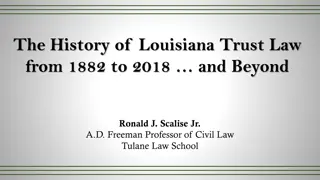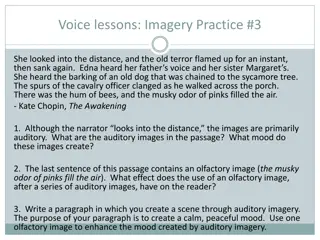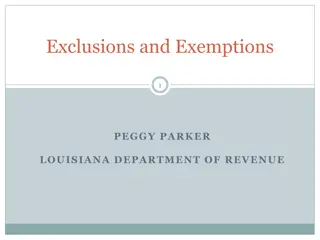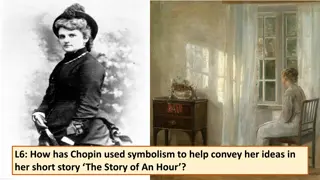Kate Chopin and Social Issues in Louisiana
Kate Chopin, a prominent writer of the late 19th century, faced societal backlash for her progressive views on women's rights and freedom, as depicted in her novel "The Awakening." Born in 1850 in St. Louis, Missouri, Chopin's upbringing without male role models influenced her feminist perspectives. Her works challenged the traditional gender norms prevalent in society, particularly in Louisiana, where the feminist movement was scarce, and women were considered the property of their husbands. Despite facing criticism, Chopin's writings sparked conversations about gender equality and individual freedom.
Download Presentation

Please find below an Image/Link to download the presentation.
The content on the website is provided AS IS for your information and personal use only. It may not be sold, licensed, or shared on other websites without obtaining consent from the author.If you encounter any issues during the download, it is possible that the publisher has removed the file from their server.
You are allowed to download the files provided on this website for personal or commercial use, subject to the condition that they are used lawfully. All files are the property of their respective owners.
The content on the website is provided AS IS for your information and personal use only. It may not be sold, licensed, or shared on other websites without obtaining consent from the author.
E N D
Presentation Transcript
A level: Contexts. Who, what where why and when
Focus: Kate Chopin Born 1850 St Louis, Missouri Father died 1855 Raised by female family members and in a Catholic boarding school No male role models A strong and intellectually astute women raised her Writing possibly derives from a lack of awareness of the male domination common at the time.
1899: The Awakening Chopin lived in Louisiana with her husband until his death Returned to Missouri along with rumours of affairs Scandalised society with her freedoms such as smoking and independence 2ndnovel The Awakening caused outrage: depiction of a woman living for herself and disregarding her role as her husband s cipher
Louisiana The feminist movement, just beginning to emerge in other parts of America, was almost entirely absent in the conservative state of Louisiana. In fact, under Louisiana law, a woman was still considered the property of her husband. Chopin s novel was scorned and ostracized for its open discussion of the emotional and sexual needs of women..
Louisiana 1890 companies to provide equal but separate accommodations for white and coluored races. The Louisiana state Legislature passed the Louisiana Separate Car Act, which called for railroad 1892 went all the way to the US Supreme Court, which upheld the law on May 18, 1896. Jun 7, Homer Plessy was arrested in New Orleans for violating the Separate Car Act. His case 1894 this year also passed a law prohibiting interracial marriage. Louisiana extended the Separate Car Act to include train station waiting rooms. The Legislature in 1896 Ferguson. The Plessy v. Ferguson decision allowed that as long as accommodation existed, segregation did not constitute discrimination, establishing the doctrine of "separate but equal." The decision gave legitimacy to the segregationist policies known as Jim Crow laws. The ruling that was overturned in the 1954 Brown case, which involved elementary education. The Court ruled unanimously that segregation in public education was a denial of the equal protection of the laws. May 18, The US Supreme Court upheld the State of Louisiana Separate Car Act in Plessy vs. 1898 black voters. May 12, Louisiana adopted a new constitution with a "grandfather clause" designed to eliminate 1898 would be recognized today as jazz. Bolden's 1898 brass band, Kid Ory's Creole Band, played their early version of jazz while marching in parades, at funerals, weddings and dances. Blues, ragtime and brass band music were blending at the end of the 19th century into what would be known as jazz. New Orleans was one of the key cities for the development of this music. Buddy Bolden, cornetist and New Orleans brass band leader, was an early practitioner of what
JIM CROW After the civil war : a period of reconstruction saw former slaves and other coloured Americans begin to make significant gains in society The response was the JIM CROW laws designed to establish utter segregation between the social strata of black and white.
Race and Miscegeny Racial purity is defined by colour of skin Technical terms grew up: Mulatto: 1 black parent Quadroon: 1 Black grandparent Octoroon: 1 Black great grandparent Novelists begin to develop plots around this the white daughter who is discovered to have black antecedents
Race 2: Creoles and Americans The French speaking Creoles were the original settlers in Louisiana or travelled South is the British took control of Canada and America in the 18th Century They were often looked down upon by the Americans who viewed them as uncultured, licentious and prone to acts of miscegeny.
Chopin: Desirees Baby (1893) a short story by Kate Chopin, features an apparently quadroon child born to two white parents; as the mother was adopted, the father assumes she has African ancestry and rejects her. He later burns a letter from his own mother; the reader learns that she was telling of her mixed-race ancestry. 3 passages follow: let s see what we can begin to glean of Chopin s style
Madame Valmonde had not seen Desiree and the baby for four weeks. When she reached L'Abri she shuddered at the first sight of it, as she always did. It was a sad looking place, which for many years had not known the gentle presence of a mistress, old Monsieur Aubigny having married and buried his wife in France, and she having loved her own land too well ever to leave it. The roof came down steep and black like a cowl, reaching out beyond the wide galleries that encircled the yellow stuccoed house. Big, solemn oaks grew close to it, and their thick-leaved, far-reaching branches shadowed it like a pall. Young Aubigny's rule was a strict one, too, and under it his negroes had forgotten how to be gay, as they had been during the old master's easy-going and indulgent lifetime. The young mother was recovering slowly, and lay full length, in her soft white muslins and laces, upon a couch. The baby was beside her, upon her arm, where he had fallen asleep, at her breast. The yellow nurse woman sat beside a window fanning herself. Madame Valmonde bent her portly figure over Desiree and kissed her, holding her an instant tenderly in her arms. Then she turned to the child. "This is not the baby!" she exclaimed, in startled tones. French was the language spoken at Valmonde in those days. "I knew you would be astonished," laughed Desiree, "at the way he has grown. The little cochon de lait! Look at his legs, mamma, and his hands and fingernails,--real finger-nails. Zandrine had to cut them this morning. Isn't it true, Zandrine?" The woman bowed her turbaned head majestically, "Mais si, Madame." "And the way he cries," went on Desiree, "is deafening. Armand heard him the other day as far away as La Blanche's cabin." Madame Valmonde had never removed her eyes from the child. She lifted it and walked with it over to the window that was lightest. She scanned the baby narrowly, then looked as searchingly at Zandrine, whose face was turned to gaze across the fields. "Yes, the child has grown, has changed," said Madame Valmonde, slowly, as she replaced it beside its mother. "What does Armand say?" Passage 1 foreshadowing, race and imagery
She sat in her room, one hot afternoon, in her peignoir, listlessly drawing through her fingers the strands of her long, silky brown hair that hung about her shoulders. The baby, half naked, lay asleep upon her own great mahogany bed, that was like a sumptuous throne, with its satin-lined half-canopy. One of La Blanche's little quadroon boys--half naked too--stood fanning the child slowly with a fan of peacock feathers. Desiree's eyes had been fixed absently and sadly upon the baby, while she was striving to penetrate the threatening mist that she felt closing about her. She looked from her child to the boy who stood beside him, and back again; over and over. "Ah!" It was a cry that she could not help; which she was not conscious of having uttered. The blood turned like ice in her veins, and a clammy moisture gathered upon her face. She tried to speak to the little quadroon boy; but no sound would come, at first. When he heard his name uttered, he looked up, and his mistress was pointing to the door. He laid aside the great, soft fan, and obediently stole away, over the polished floor, on his bare tiptoes. She stayed motionless, with gaze riveted upon her child, and her face the picture of fright. Presently her husband entered the room, and without noticing her, went to a table and began to search among some papers which covered it. "Armand," she called to him, in a voice which must have stabbed him, if he was human. But he did not notice. "Armand," she said again. Then she rose and tottered towards him. "Armand," she panted once more, clutching his arm, "look at our child. What does it mean? tell me. Passage 2
Desiree had not changed the thin white garment nor the slippers which she wore. Her hair was uncovered and the sun's rays brought a golden gleam from its brown meshes. She did not take the broad, beaten road which led to the far-off plantation of Valmonde. She walked across a deserted field, where the stubble bruised her tender feet, so delicately shod, and tore her thin gown to shreds. She disappeared among the reeds and willows that grew thick along the banks of the deep, sluggish bayou; and she did not come back again. Some weeks later there was a curious scene enacted at L'Abri. In the centre of the smoothly swept back yard was a great bonfire. Armand Aubigny sat in the wide hallway that commanded a view of the spectacle; and it was he who dealt out to a half dozen negroes the material which kept this fire ablaze. A graceful cradle of willow, with all its dainty furbishings, was laid upon the pyre, which had already been fed with the richness of a priceless layette. Then there were silk gowns, and velvet and satin ones added to these; laces, too, and embroideries; bonnets and gloves; for the corbeille had been of rare quality. The last thing to go was a tiny bundle of letters; innocent little scribblings that Desiree had sent to him during the days of their espousal. There was the remnant of one back in the drawer from which he took them. But it was not Desiree's; it was part of an old letter from his mother to his father. He read it. She was thanking God for the blessing of her husband's love:-- "But above all," she wrote, "night and day, I thank the good God for having so arranged our lives that our dear Armand will never know that his mother, who adores him, belongs to the race that is cursed with the brand of slavery. Passage 3
The Awakening 1899 A married woman, left to her own devices during the summer, tires of the restrictions placed on society She does not enter New Orleans society She takes a lover She explores the emotional freedom of music She tires of life as she is awakened
Artistic Contexts and Intertextuality What happens when specific music is mentioned in a text? If a writer does nothing by chance, then there must be a reason for the music being used
The Awakening Zampa Overture: a trite operetta about pirates and damsels in distress zampa overture piano duet from 5.27 Chopin Prelude Piano music, therefore intimate, form the figure at the centre of the romantic movement in the early 19th century. Impromptu 4 Tristan und Isolde Liebstod: Schopenhauer influenced opera focusing on betrayal and love ending in death and transfiguration of the heroine Liebestodt
Schopenhauer Recognition of the central message of the opera Tristan can give interesting insights A musical intertextuality Man, according to Schopenhauer, is driven by continued, unachievable desires, and the gulf between our desires and the possibility of achieving them leads to misery while the world is a representation of an unknowable reality. The world-view of Schopenhauer dictates that the only way for man to achieve inner peace is to renounce his desires.
In the novel Edna Pontellier is played the Liebestod by the curious and gnome-like Mlle Reisz, we read the following passage: Edna did not know when the Impromptu began or ended. She sat in the sofa corner reading Robert s letter by the fading light. Mademoiselle had glided from the Chopin into the quivering love notes of Isolde s song, and back again to the Impromptu with its soulful and poignant longing. The shadows deepened in the little room. The music grew strange and fantastic turbulent, insistent, plaintive and soft with entreaty. The shadows grew deeper. The music filled the room. It floated out upon the night, over the housetops, the crescent of the river, losing itself in the silence of the upper air. Edna was sobbing, just as she had wept one midnight at Grand Isle when strange, new voices awoke in her. She arose in some agitation to take her departure. May I come again, Mademoiselle? she asked at the threshold. Come whenever you feel like it. Be careful; the stairs and landings are dark; don t stumble. Mademoiselle reentered and lit a candle. Robert s letter was on the floor. She stooped and picked it up. It was crumpled and damp with tears. Mademoiselle smoothed the letter out, restored it to the envelope, and replaced it in the table drawer.
Intertextuality in music If we know the Wagner/Schopenhauer link, we know 3 things: Edna will not find satisfaction in her new desires Edna will renounce her love and life to achieve some form of quietus. Since Isolde s song is sung as a form of suicidal release, there will only be one end ot the novel.
The golden shimmer of Ednas satin gown spread in rich folds on either side of her. There was a soft fall of lace encircling her shoulders. It was the color of her skin, without the glow, the myriad living tints that one may sometimes discover in vibrant flesh. There was something in her attitude, in her whole appearance when she leaned her head against the high- backed chair and spread her arms, which suggested the regal woman, the one who rules, who looks on, who stands alone. But as she sat there amid her guests, she felt the old ennui overtaking her; the hopelessness which so often assailed her, which came upon her like an obsession, like something extraneous, independent of volition. It was something which announced itself; a chill breath that seemed to issue from some vast cavern wherein discords waited. There came over her the acute longing which always summoned into her spiritual vision the presence of the beloved one, overpowering her at once with a sense of the unattainable.
The water of the Gulf stretched out before her, gleaming with the million lights of the sun. The voice of the sea is seductive, never ceasing, whispering, clamoring, murmuring, inviting the soul to wander in abysses of solitude. All along the white beach, up and down, there was no living thing in sight. A bird with a broken wing was beating the air above, reeling, fluttering, circling disabled down, down to the water. Edna had found her old bathing suit still hanging, faded, upon its accustomed peg. She put it on, leaving her clothing in the bath-house. But when she was there beside the sea, absolutely alone, she cast the unpleasant, pricking garments from her, and for the first time in her life she stood naked in the open air, at the mercy of the sun, the breeze that beat upon her, and the waves that invited her. How strange and awful it seemed to stand naked under the sky! how delicious! She felt like some new-born creature, opening its eyes in a familiar world that it had never known. The foamy wavelets curled up to her white feet, and coiled like serpents about her ankles. She walked out. The water was chill, but she walked on. The water was deep, but she lifted her white body and reached out with a long, sweeping stroke. The touch of the sea is sensuous, enfolding the body in its soft, close embrace. She went on and on. She remembered the night she swam far out, and recalled the terror that seized her at the fear of being unable to regain the shore. She did not look back now, but went on and on, thinking of the blue- grass meadow that she had traversed when a little child, believing that it had no beginning and no end. Her arms and legs were growing tired. She thought of Leonce and the children. They were a part of her life. But they need not have thought that they could possess her, body and soul. How Mademoiselle Reisz would have laughed, perhaps sneered, if she knew! And you call yourself an artist! What pretensions, Madame! The artist must possess the courageous soul that dares and defies. Exhaustion was pressing upon and overpowering her. Good-by because I love you. He did not know; he did not understand. He would never understand. Perhaps Doctor Mandelet would have understood if she had seen him but it was too late; the shore was far behind her, and her strength was gone. She looked into the distance, and the old terror flamed up for an instant, then sank again. Edna heard her father s voice and her sister Margaret s. She heard the barking of an old dog that was chained to the sycamore tree. The spurs of the cavalry officer clanged as he walked across the porch. There was the hum of bees, and the musky odor of pinks filled the air.
A level Literature and History There are clear links between the disciplines which become evident when you engage in wider reading and wider thought. Enjoy this: GCSE is so restrictive. It is time to spread your wings























